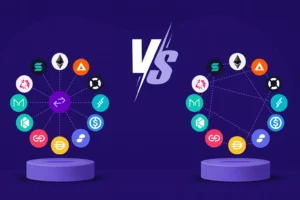
What is Merkle’s Root?
A Merkle root is a simple mathematical method for convolution on a Merkle tree. It is used in cryptography to ensure that data blocks sent through Peer-to-peer (P2P) networks are complete, undamaged, and unaltered.
Understanding a Merkle Root
A blockchain consists of various blocks that are linked to each other. A hash tree or Merkle tree in blockchain encodes blockchain data efficiently and securely. It enables the verification of blockchain data and the quick transfer of large amounts of data across a P2P blockchain network. Each transaction on the blockchain network is associated with a hash. However, these hashes are not stored sequentially but rather as part of a structured tree.
In this structure, each hash is related to its parent in a parent-child tree-like relationship. Since there are multiple transactions in a block, all transaction hashes in the block are hashed together, resulting in the Merkle root. The Merkle tree in blockchain and the Merkle Root mechanism significantly reduce the hashing level for performance, enabling faster verification and transactions. The Merkle root hashing process can verify specific leaf nodes (transaction IDs or hashes) in the Merkle tree. If you are familiar with how Bitcoin works, you might know that transaction hashes are combined into a single hash, called the Merkle root, which is included in the block header. This single hash can validate every transaction hash in a block, ensuring the integrity and security of blockchain data.
Advantages
-
Tamper Detection
It is easy to check whether a transaction has been tampered with or not.
-
Resource Efficiency
The Merkle root uses fewer resources to generate and verify hashes, making it highly efficient.
-
Transaction Inclusion Verification
It simplifies verifying whether a specific transaction has been included in a block.
-
Tamper-Proof Mechanism
The Merkle root ensures data integrity and is resistant to tampering.
Verify Your Transaction Now with SPF!
Merkle Roots allows users to verify that specific transactions have been included in a block without downloading the entire blockchain development services. This is achieved using a protocol called SPF (Simple Payment Verification). This protocol simplifies payment verification, allowing users to check if their transaction has been processed.






